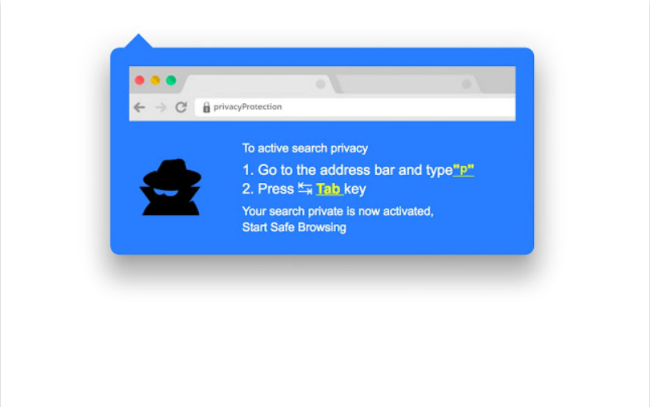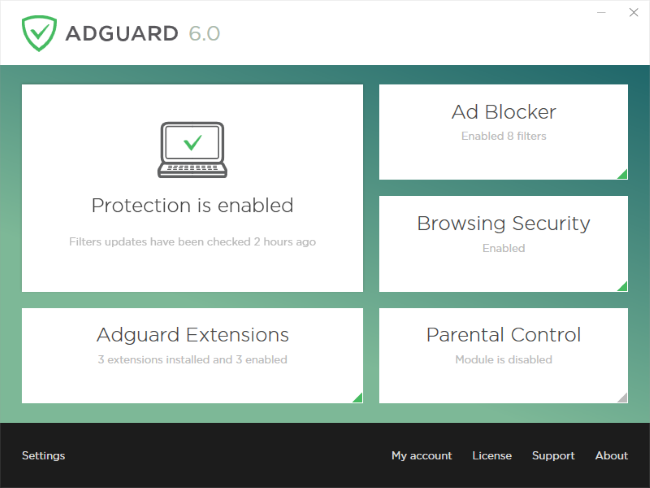What is privacyProtection?
privacyProtection is supposed to protect your privacy when browsing the Internet. The way of distributing this application is very tricky. And if you wonder how it was installed on your computer, then you just failed to disable additional components offered by the download client that comes with a free program from the Internet. Once installed, it takes over all browsers on computer, alters them settings and prevents access to them for user. It also exhibits symptoms that include slowness of the system, appearance of bothersome pop-up ads and redirection of all searches.

Another unpleasant feature of privacyProtection is a tracking feature. The program is able to process and collect all information passing through the browser like IP addresses, browser activity history, searching results, passwords, account details and so on. Subsequently, these data can be exposed to identity thieves. It is noteworthy that removing manually is not sufficient for this type of infection since it intends to leave some files behind so that it can be re-launched anytime. That’s why, it will be better to use automated removal tools in this case that will do it much faster. privacyProtection is merely a tool for making money through distributing advertisements which means it doesn’t care about your browsing experience. If you want to get rid of ads by privacyProtection and remove this malware, then you can easily do that by following this guide.
How to remove privacyProtection from your computer?
The best and easiest way to remove privacyProtection from your computer is to use special anti-malware program that has this threat in its database. The program is fully automated, all you need to do is to download and install it. Once you’ve installed anti-malware application, it will scan your system and remove all the threats.
It scans your computer and detects various threats like privacyProtection, then removes it with all of the related malicious files, folders and registry keys. After deep scanning of your system, it will easily find and delete privacyProtection. Use this removal tool to get rid of privacyProtection for FREE.

Norton 360 Antimalware – this program will help you to get rid of privacyProtection. It can find malicious program that is corrupting your system and clean up junk files after removal.
CleanMyMac – fully removes all instances of privacyProtection from Mac and Safari. After deep scanning of your system, it will easily find and delete privacyProtection. Use this removal tool to get rid of privacyProtection for FREE.
Combo Cleaner – can find malicious program that is corrupting your system and clean up junk files after removal.
How to remove privacyProtection manually
Remove privacyProtection from Control Panel
In order to get rid of privacyProtection, first thing you need to do is to uninstall malicious program from your computer. When removing privacyProtection, try to find suspicious recently installed programs and delete them too, as it’s pretty common that any malware comes with some other unwanted programs.
Windows XP:
- Select Start.
- Control Panel.
- Then choose Add or Remove Programs.
- Search for privacyProtection.
- Click Uninstall.
Windows 7/Windows Vista:
- Select Start.
- Then Control Panel.
- Choose Uninstall a Program.
- Find privacyProtection and choose Uninstall.
Windows 8/Windows 8.1:
- Open the Menu.
- Select Search.
- After that choose Apps.
- Next Control Panel.
- Then as in Windows 7, click Uninstall a Program under Programs.
- Find privacyProtection, select it and choose Uninstall.
Windows 10:
- Click on the Start button (or press the Windows key) to open the Start menu, then select Settings at the top.
- Choose App & features on the left menu.
- On the right side, find privacyProtection and select it, then click on the Uninstall button.
- Click on Uninstall to confirm.
Mac OSX:
- Launch Finder
- Select Applications in the Finder sidebar.
- If you see Uninstall privacyProtection or privacyProtection Uninstaller, double-click it and follow instructions
- Drag unwanted application from the Applications folder to the Trash (located on the right side of the Dock)
Note: If you can’t find required program, sort programs by date in Control panel and search for suspicious recently installed programs. If you still can’t locate any suspicious program or not sure what some application is for, we advise you to use SpyHunter free scanner in order to track down what malicious program is infecting your system.
privacyProtection won’t uninstall
There are a lot of options in any Windows version for removing applications. Still, not all the programs can be completely deleted using these options. Adware, Badware and Potentially Unwanted Programs (PUPs) are too stubborn to be removed, more than that, there are created this way, created to be hard to get rid of them. That’s why sometimes you can’t uninstall them using standard Windows options. You’ll probably get this message: “You do not have sufficient access to uninstall privacyProtection. Please, contact your system administrator.” To remove stubborn privacyProtection, you can use SpyHunter removal tool, it will completely remove privacyProtection from your computer. Or you may try to use Safe Mode:
For Windows XP, Vista, 7
- Turn off your PC;
- Turn it on and immediately press F8 button;
- You’ll see Advanced Boot Options menu;
- Select Safe Mode with arrow buttons;
- In Safe Mode navigate to Control Panel, then choose Uninstall a program and remove “privacyProtection”.
For Windows 8/8.1 and 10
- Press the Win+R buttons, type msconfig in box and press Enter;
- Choose Boot tab, and click on Safe Boot check box;
- Select the type of Safe Mode: Minimal or Network;
- Press OK and reboot your PC;
- In Safe Mode navigate to Control Panel, then choose Uninstall a program and remove “privacyProtection”.
You can also perform Clean Boot. You need to turn off all the startup programs that may be the reason why the program won’t uninstall.
- Press Windows + R;
- In the Run window type msconfig;
- Choose Services section;
- Find Hide all Microsoft services line, tick the box;
- The click Disable all;
- Return back to General section;
- Find the line Selective startup and untick the box Load startup items;
- Select Apply, then OK;
- Reboot your PC;
- Remove privacyProtection from Control Panel.
Step 2: Remove privacyProtection from browsers
Once you’ve uninstalled the application, remove privacyProtection from your web browser. You need to search for recently-installed suspicious add-ons and extensions.
Google Chrome:
- Open Google Chrome
- Push Alt + F.
- Choose Tools.
- Select Extensions.
- Search for privacyProtection.
- Select the trash can icon to remove it.
Safari:
- Click Preferences from Safari menu
- Select Extensions.
- Find privacyProtection or other extensions that look suspicious.
- Click Uninstall button to remove it.
Mozilla Firefox:
- Open Firefox.
- Push Shift + Ctrl + A.
- Select privacyProtection.
- Choose Disable or Remove option.
Internet Explorer:
- Open IE.
- Push Alt + T.
- Choose Manage Add-ons option.
- Click Toolbars and Extensions.
- Next select Disable privacyProtection.
- Choose More information link in the left-bottom corner.
- Click Remove button.
- If this button is grayed out – perform alternative steps.
How to block malicious pop-ups in browsers

Adguard is a perfect application that will get rid your system of annoying ads, online tracking and will provide reliable protection from malware. The main advantage of Adguard is that you can easily block any types of ads whether legitimate they or not within your browser. Use it for FREE.
Adguard provides 14 days for trial use, to continue using the program, you will need to purchase the full version: $19.95 for a yearly subscription/ $49.95 for lifetime version. By clicking the button, you agree to EULA and Privacy Policy. Downloading will start automatically.

